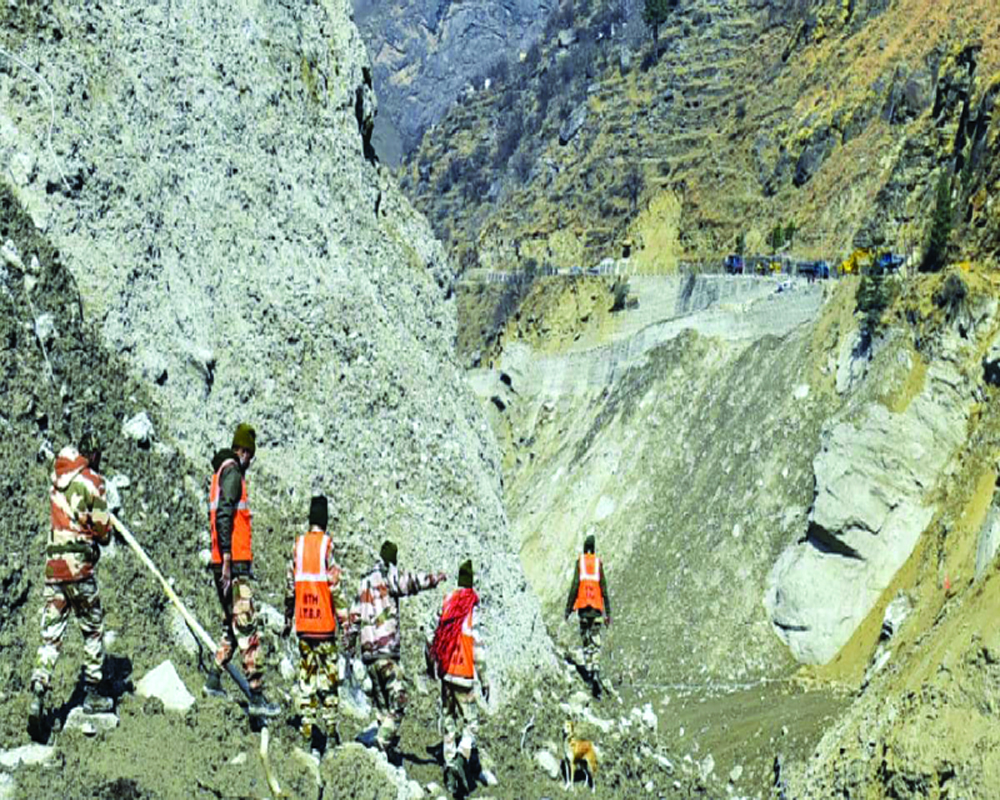If we continue to inflict irreversible damage to the environment, nature will restore its balance in the way it likes
The recent flash floods in Rishiganga river in Chamoli district of Uttarakhand had wreaked havoc in the region and brought untold misery to the locals and families of those workers who died in the catastrophe. The incident came as a surprise to the scientific community and locals as floods usually occur during the monsoon season and a deluge of such a magnitude was highly unexpected in winter months.
The Uttarakhand Government and the Centre’s disaster management apparatus swung into action for the rescue and relief operations. Though many lives have been saved since then, it was already too late for those who drowned or were swept away by the flash flood.
So strong was the surge of water in Dhauliganga and Rishiganga rivers that it ripped through two hydel projects. The bodies of victims are still being found at different locations by the river, but rescuers have so far failed to reach anyone — dead or alive — in the tunnel network at the National Thermal Power Corporation’s Tapovan project.
In the meanwhile, satellite images have confirmed that the debris accompanying the deluge earlier this week has blocked a stream that joins the Rishiganga river, forming a temporary lake, which if breached, can cause another flash flood and more devastation.
Uttarakhand is situated in the western Himalayas, which is of recent origin geologically and is an unstable mountain zone due to the gradual tectonic shift in the Himalayan plate towards the north every year. This makes it vulnerable to earthquakes and underground geological changes which suddenly release energy and cause natural upheavals of gigantic proportions, disturbing the ecological foundation of the region and taking a toll on human lives.
Glaciers are a slow-moving mass or river of ice, formed through the gradual accumulation of snow on mountains. This accumulation takes place over decades. It is natural for glaciers to melt and break because of climatic factors and also due to underground geological changes.
However, disasters like the glacier burst that took place in Chamoli, are compounded by unabated and irresponsible human activities and lopsided Government policies with scant regard for environmental laws. However, this poor decision-making with regards to the environment by the bureaucrats and politicians is not just limited to Uttarakhand but can be witnessed all over the nation. The unscientific and haphazard construction of roads and buildings on the hilly slopes without proper risk assessment and other technical details incurs a heavy cost on the environment across India and Uttarakhand. However, construction of dams and small hydroelectric projects all along the rivers in Uttarakhand is the root cause of the misery we face time and again in the State. The Tapovan 520-Megawatt (MW) and Rishiganga 13 MW projects have been completely washed away in this flood. More than 50 hydroelectric projects were either sanctioned or are running in Uttarakhand and these were sanctioned despite expert opinion against them. Even today many cases are pending in the Supreme Court on this issue.
It is argued that the geological movement of the glaciers might have been triggered by the regular blasting of the hills. For such recurrent tragedies, the governance structures are to be blamed.
The Ministry of Environment, Forest and Climate Change, over the last several years adopted an expeditious approach in giving clearances to hydroelectric and other developmental projects. This was allegedly done without undertaking proper scrutiny and brushing aside objections concerning the environment that were raised time and again. It must be held accountable.
Be it mining or any other developmental projects, compliance with necessary conditions was never monitored in a systematic manner. In Uttarakhand in most of these hydro projects the disposal of muck and sludge is done in an unscientific manner. This is one of the main reasons for such calamities taking epic proportions.
It is high time the Uttarakhand Government and the Centre pay heed to the environmental experts who had been advising the two governments to change their development focus. It must be sustainable and not reckless and unscientific. The Government must set its priorities right and act on it before it is too late. If we continue to inflict irreversible damage on the environment, nature will act in its own manner to restore its balance.
The management of our ecology must be given equal priority by policymakers, if not precedence, over other approaches in resources management. Over the years the share of the environment in the Union Budget has declined. It is a pittance considering the magnitude of integration needed for the holistic management of natural resources and to tackle the challenge of climate change. It is worth remembering an old saying: “Progress is impossible without change and those who cannot change their minds cannot change anything.”
Top babus and Ministers at the Centre and State must adhere to this advice.
The writer is a retired civil servant. The views expressed are personal.


























